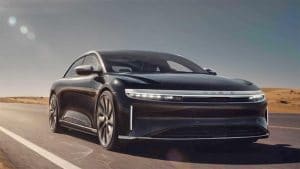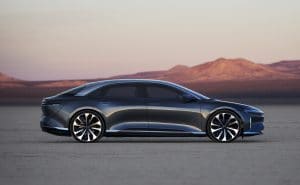
Lucid executives claim that their first expected product, the Air, will run the quarter mile in a mere 9.9 seconds — faster than the Ford Mustang GT500.
If you still think battery cars are sluggish and stodgy, barely able to get out of their own way, you obviously haven’t checked out the latest in the EV market – and even for those who understand what the instant torque of an electric motor can deliver, the performance of the new Lucid Air is likely to come as a shock.
Though the battery sedan won’t be formally introduced until Sept. 9, the startup has been dribbling out details for several weeks. The latest e-mail to come across our digital transom reveals that the Lucid Air set to come to market sometime next spring will be able to run the quarter mile in a mere 9.9 seconds. That’s nearly a second faster than the Ford Shelby GT500 and within an eye-blink of what Dodge claimed for the Challenger Hellcat Demon of a couple years back.
It helps that the Lucid Air makes even more power than the Demon, a mind-boggling 1,080 horsepower peak output from its two electric motors, one on each axle.
(Lucid Air to offer biggest battery pack of any EV — and longest range.)
“Our watchword has been ‘focus’ since day one at Lucid – a focus on sound engineering principles, a focus on creating efficiencies, and a focus on maximizing power to create a world-class EV,” Peter Rawlinson, the CEO and CTO of Lucid Motors, said in a statement.
EV fans are likely to pour over the numbers from Lucid. We’ve already learned that the sedan achieved what would be an industry-record 517 miles per charge in an EPA simulation run by the independent EV consulting firm FEV North America. That’s over 100 miles more than the newest and longest-range version of the Tesla Motor S with only a slightly larger, 110 kilowatt-hour battery pack.
Rawlinson has made a big thing about the efficiency of the overall package known as the Lucid Air. Based on what we’ve learned so far, the sedan can muster an impressive 4.58 miles per kWh compared with 4.02 for the most efficient Tesla Model S.
How much that efficiency will drop when you’ve got your foot to the floor is uncertain but you’ll certainly feel some neck-snapping performance, the Air claimed to hit 60 in 2.5 seconds, or about 0.2 seconds slower than the highest-rated version of the Tesla sedan.
(Lucid working up second model – even as it announces potential record-setting charging times.)
Significantly, that model didn’t come out at launch and Lucid has hinted that it has some tricks still up its sleeve that could translate into its own upgrade in performance.

The Lucid Air is the first EV to use a 900-volt system, exceeding the 800-volt system on the new Porsche Taycan.
The automaker noted in its latest release that the highly compact and integrated powertrain system it has developed “allows for one, two, or even three units to be used to power a Lucid Air.”
Considering each individual motor drive assembly can reach a maximum of 650 hp, that would suggest the upside in performance could be substantial. Lucid claims each unit is roughly half the weight and about 59% more powerful than the closest competitor’s alternative.
Two other numbers that Lucid has released should catch the eye of not only EV fans but those still skeptical of the technology. The Air’s electric architecture will operate at 900 volts, the highest in the business – Porsche setting the previous record with the 800-volt Taycan technology. That, in turn, will allow the Lucid Air to add as much as 300 miles of additional range in just 20 minutes using the latest, 350-kilowatt public quick chargers.
(Lucid claiming 517-mile range for new Air EV.)
We’ll have to wait for next week to learn more but it appears the drive system Lucid has developed will offer another impressive number, each combining not only a synchronous AC motor but inverter, transmission and differential in a package weighing just 163 pounds.

